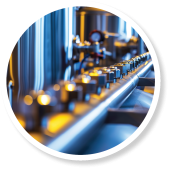https://doi.org/10.15255/KUI.2009.024
Published: Kem. Ind. 59 (5) (2010) 215–226
Paper reference number: KUI-24/2009
Paper type: Professional paper
Download paper:  PDF
PDF

Improvement of the Rotary Dryers of Wet Pelletized Oil-Furnace Carbon Blacks
N. Zečević
Abstract
Due to the demand for higher production capacity and natural-gas energy savings, improvements were made to the rotary dryers in the drying process of wet pelletized oil-furnace carbon blacks. Since the rotary dryers were originally designed for drying semi-wet pelletized oil-furnace carbon blacks, they did not entirely satisfy optimal conditions for drying wet pelletized oil-furnace carbon blacks. Figure 1 shows the drying principle with key dimensions. The energy for drying the wet pelletized oil-furnace carbon blacks was provided by natural gas combustion in an open-furnace system with an uncontrolled feed of combustion air. Improvements on the rotary dryers were carried out by adjusting the excess oxygen in the gases passing through the butterfly valve on the dryer exhaust stack. By regulating the butterfly valve on the dryer exhaust stack, and applying the prescribed operations for drying wet pelletized oil furnace carbon blacks, the excess oxygen in the tail gases was adjusted in the range of φ = 3.0 % and 5.0 %, depending on the type of oil-furnace carbon blacks. Suggested also is installation of a direct-reverse automatic butterfly valve on the dryer exhaust stack to automatically determine the volume fraction of oxygen in the tail gas, and the volume flow rate of natural gas for combustion. The results the improvements carried out are shown in Tables 3 to 5. Table 2 shows the thermal calculations for the hood of the rotary dryer. Preheating of the process water in the temperature range of 70 °C and 80 °C is also recommended using the net heat from the oil-furnace process for wet pelletization. The results of preheating the process water are shown in Table 1. Depending on the type of oil-furnace carbon black, the aforementioned improvements resulted in natural gas energy savings ranging from 25 % to 35 % in relation to the average natural gas requirement in the drying process, and thus a reduction in carbon emissions of up to 40 %, which is shown in Table 6. A schematic of the next proposed situation for complete automatization of the process for drying wet pelletized oil-furnace carbon blacks is shown in Figure 2.

This work is licensed under a Creative Commons Attribution 4.0 International License
Keywords
rotary dryer, excess oxygen, wet pelletized oil-furnace carbon black, preheating of process water, energy efficiency









